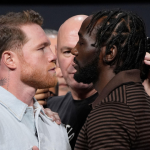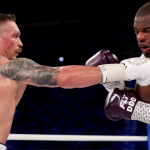BOXING is the formalized version of the international sport of fist fighting—the barriers to entry are few and world champions have been produced all over the world. But of the eighty or so men who have worn some variant of the world heavyweight title, the vast majority have been from the United States. Europe as a whole had four world heavyweight champions from 1899 until the 1990s. Mexico—despite producing over two hundred world champions—saw its first world heavyweight champion crowned this year in Andy Ruiz. Despite punching well above its weight in the amateur divisions—with the second-most gold medals in Olympic boxing history—Cuba has a chance at its first world heavyweight champion as Luis Ortiz challenges for Deontay Wilder’s title this weekend.
Since the 1960s Cuba has produced amateur world champion after amateur world champion, but the ban on professional sports in the country meant that great fighters had to choose between their home (where they already had fame) and a professional career. Cuba did produce two heavyweight supermen: Teofilo Stevenson in the seventies and Felix Savon in the nineties. Both were three-time Olympic gold medalists and both were approached with offers of big-money world championship fights at the professional level—for Stevenson the opponent was Muhammad Ali, for Savon it was Mike Tyson. Neither fight came to fruition but both Savon and Stevenson have remained enormous “what ifs” for boxing fans.
On this day in 1980, Teofilo Stevenson won his 3rd @Olympics gold! His story comes to life in our upcoming Five Rings Films series. pic.twitter.com/TVuG0ZbpLP
— Olympic Channel (@olympicchannel) August 2, 2017
Like any Cuban boy who walks into a boxing gym, Luis Ortiz was likely inspired to some degree by Teofilo Stevenson. He had a good start and got onto the Cuban national team as a heavyweight, but had nothing like Stevenson’s success. In 2010, as something of a failed prospect, Ortiz defected to the U.S. and went professional at the ripe old age of thirty. Yet in almost ten years since his first professional fight, he has lost just once—to the heavyweight champion, Deontay Wilder. Furthermore, until Tyson Fury, Ortiz gave arguably the best account of any Wilder opponent.
While Ortiz was recognized as a big hitter going into the first Wilder fight, his technical chops were somewhat underrated. He moves well for a big man, gives awkward looks as a southpaw, and combines a good jab with a great eye for a counter. The reason that his age has not proven to be much of an issue is that he is a wily old geezer—he changes his game to match what he sees in the ring and while he is known for the big counter left he really can do a little bit of everything.
In the first Wilder – Ortiz bout, Ortiz did an excellent job of cutting off the champion’s terrific right hand, shooting straight lefts to the gut and sliding down the outside of Wilder’s lead foot. Standard southpaw vs orthodox tactics but with Wilder’s relatively limited skill set it left the champ with very few options. Wilder’s jab has always been serviceable and with his height and reach it can be a problem for his opponents, but the southpaw Ortiz was able to hand fight Wilder’s jab into ineffectiveness for the most part. Even when Wilder was able to free his left hand and jab, Ortiz was often able to shoot his own up the inside and beat Wilder to the punch.
Circling right, slapping down Wilder’s lead glove and shooting in his own jab. Ortiz’s left-handed hitting tended to be done with quick left straights to the body and that worked well.
But there has never really been a boxer like Deontay Wilder—he might rank among the strangest fighters in history. He towers over most of his opponents but where Anthony Joshua buffed up and Tyson Fury cannot help but come in heavy, Wilder often chooses to come into fights just over the cruiserweight limit. He stands almost completely side on and half-assedly jabs for rounds at a time, giving away points on the cards and waiting for the moment that he can drop his right hand. When he actually has opponents hurt he cannot help but sprint in, windmilling like he is on a local tough man show. He hits the body maybe twice a fight. He is willing to let his opponent throw and land punches at a higher rate than him just to time them with the one good shot. And frankly, there is no shot quite like it. From Louis to Marciano to Tyson, there might never have been a heavyweight champion with the one punch finishing power that Wilder has. His right hook can be a tremendous swing that can go wide over an orthodox fighter’s jab or tight over a southpaw’s left straight, and his right straight is perhaps the stiffest you will ever see.
At the end of the ninth round, Wilder finally timed his right hand across the top of Ortiz’s left and stumbled the Cuban. As the tenth began, Wilder’s output suddenly increased and the rights were coming in with regularity.
The intrigue here is that not only did Ortiz have success when he boxed with Wilder, he had decent success slugging with him too. While it was ultimately getting a little predictable and hunting for big left hands that got Ortiz caught, it has to be encouraging that he took some of Wilder’s biggest shots through the first nine rounds without much trouble. What’s more, Wilder has fought just one rematch in his professional career against the much less skilled technician, Bermane Stiverne. Part of Wilder's brilliance is that you just don’t believe that he is going to sit back and lose rounds until he can land one big bomb—it seems so unlikely—and yet everyone gets caught all the same. A second go-around against Wilder might encourage Ortiz to get to the body earlier and work in combination with more confidence, knowing Wilder’s low output in the early going.
Make no mistake, pulling this off will be an uphill battle for Ortiz at his advanced age, but then so was becoming a world heavyweight title challenger in the first place. What Ortiz has been able to do as a professional has been remarkable, and if he wins the heavyweight crown on Saturday you can expect to hear a great deal more about how lacklustre he was as an amateur and just how good Teofilo Stevenson and Felix Savon would have been as professionals.



